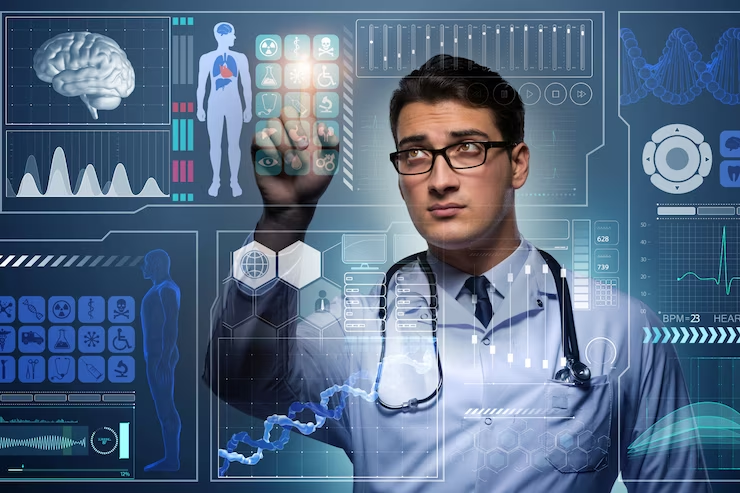

By Haley Holmes
Sep 21, 2023
Table Of Contents
Introduction to Natural Language Processing (NLP)
Natural Language Processing (NLP) is the interdisciplinary study that deals with the interaction between computers and human languages. It combines linguistics, computer science, information engineering, and artificial intelligence to develop algorithms that can process and analyze large amounts of natural language data.
NLP technologies have found diverse applications across various fields, including machine translation, chatbots, speech recognition, and information retrieval. Moreover, NLP plays a crucial role in emerging areas like human-computer interaction, natural language interfaces to databases, and question-answering systems. The concept of NLP emerged in the early 1990s and has since evolved into a robust field that relies on computational methods to process and analyze human language data. Leveraging this information, NLP enables interpretation, synthesis, and reasoning with text. The 1990s saw a revolutionary shift with the increasing prevalence of human-in-the-loop systems in NLP research.
In recent times computerized systems remain the primary source of input data. However, there is a growing reliance on machine learning algorithms to generate outcomes in NLP. The challenges in NLP stem from the inherent ambiguity and constant evolution of human language. To be successful, NLP algorithms must effectively address this ambiguity and adapt to changes. Furthermore, NLP must be scalable to manage the massive volume of data generated by humans on a daily basis.
Despite the obstacles it faces, NLP has experienced significant advancements in recent years, attributed to enhanced computing capabilities and the abundance of data accessible. Ongoing research and development will further strengthen NLP, enhancing its resilience and efficacy, ultimately establishing it as an indispensable tool for handling human language.
The Potential of Natural Language Processing for Healthcare in 2023
Natural Language Processing plays a crucial role in healthcare across various domains. In 2023, it will aid clinicians in comprehending clinical notes, extracting important information from medical records, and automating administrative tasks. NLP facilitates efficient patient interactions, reduces waiting times, and supports clinical decision-making, ultimately leading to improved patient outcomes. By leveraging NLP technologies, doctors can save time, respond promptly to patient concerns, and collaborate effectively with other professionals.
Applications of Natural Language Processing in Healthcare
In healthcare, Natural Language Processing, as a form of artificial intelligence, enables the interpretation of human language to benefit medical professionals and patients. It helps doctors understand patient medical records, identify trends in patient health, and make informed decisions regarding patient care. Additionally, NLP can facilitate the development of chatbots or virtual assistants that assist patients in scheduling appointments, refilling prescriptions, and obtaining health-related information.
Enhancing Natural Language Processing with Artificial Intelligence
The application of artificial intelligence (AI) in healthcare can be significantly enhanced through the utilization of natural language processing (NLP). AI technologies can play a crucial role in aiding doctors in generating clinical reports, identifying important terms within these reports, and converting them into concise clinical summaries. By employing semantic analysis, AI can effectively find out the meaning of each word in the clinical report, facilitating precise and efficient data organization. This, in turn, enables better data sorting, leading to more accurate conclusions and actionable insights for improved healthcare outcomes.
The continuous evolution of technology, the adoption of artificial intelligence (AI) in healthcare is gaining widespread popularity. One specific domain where AI proves exceptionally beneficial is natural language processing (NLP). NLP, a branch of AI, is focused on comprehending and manipulating human language. Given the unstructured and intricate nature of healthcare data, conventional approaches to medical documentation often face challenges. However, AI-powered NLP comes to the rescue by effectively deciphering and extracting crucial information and insights from this data. By doing so, it not only enhances patient care but also automates clinical documentation, streamlining healthcare processes.
In healthcare, AI offers various opportunities to enhance natural language processing (NLP). For instance, machine learning enables the development of algorithms that automatically identify and categorize medical entities like diseases, symptoms, and medications. This accelerates data analysis while improving accuracy. Moreover, AI can facilitate the creation of chatbots and digital assistants, making information and services more accessible to patients. These tools also support healthcare professionals by providing guidance to make informed decisions about patient care. Overall, AI-powered NLP empowers healthcare organizations with efficient and effective data analysis, leading to improved patient care and a deeper understanding of healthcare data.
Conclusion
NLP-based solutions are revolutionizing healthcare by providing accurate data and information to support doctors. The utilization of AI-powered NLP addresses the challenge of diverse healthcare data and enables physicians to gain timely and valuable insights. The adoption of innovative technologies like medical scribe software can reduce doctors' workload, enhance efficiency, and improve the quality of patient care. By leveraging AI-powered NLP, healthcare facilities can prioritize patient care, enhance data collection accuracy, and deliver an improved patient experience.

Please fill out this form.
We will reach out to you within 24 hours

Haley Holmes

Haley Holmes

Documentation is an important daily clinical responsibility. In order to optimize patient care, physicians are always on the lookout for new ways to effectively and efficiently document patient visits.
The use of virtual medical scribes has become increasingly popular in the recent years, as medical practices across the country are on the constant lookout for ways to reduce clinical documentation overload, thereby improving overall productivity.
The clerical burden associated with EHR usage is attributed as the number one cause of physician burnout. We also know that physicians spend twice as much time on EHRs and other clerical tasks compared to the time providing patient care.